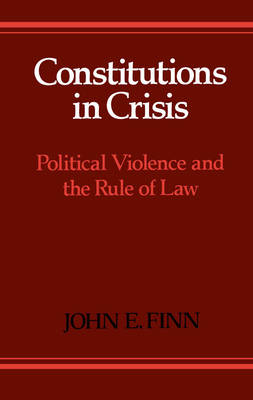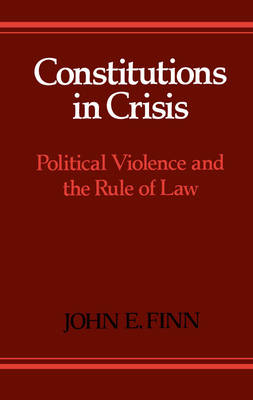
Bedankt voor het vertrouwen het afgelopen jaar! Om jou te bedanken bieden we GRATIS verzending (in België) aan op alles gedurende de hele maand januari.
- Afhalen na 1 uur in een winkel met voorraad
- In januari gratis thuislevering in België
- Ruim aanbod met 7 miljoen producten
Bedankt voor het vertrouwen het afgelopen jaar! Om jou te bedanken bieden we GRATIS verzending (in België) aan op alles gedurende de hele maand januari.
- Afhalen na 1 uur in een winkel met voorraad
- In januari gratis thuislevering in België
- Ruim aanbod met 7 miljoen producten
Zoeken
€ 313,95
+ 627 punten
Omschrijving
In this compelling study, which unites the fields of constitutional theory and comparative politics, John E. Finn examines how the efforts of two western liberal democracies, the United Kingdom and the Federal Republic of Germany, to cope with domestic terrorism threatens their constitutional integrity. Finn argues first that widespread political violence challenges the presuppositions of constitutional authority in any liberal democracy, namely that reason and deliberation, and not passion or will, can be the basis of political community. Terrorism therefore constitutes both a specific type of constitutional emergency and a challenge to the more general enterprise of constitutional maintenance. He then proceeds to review the efforts of the United Kingdom and Germany to control political violence through emergency legislation, and considers to what extent such measures comport with the demands of constitutionalism and the rule of law.
Specificaties
Betrokkenen
- Auteur(s):
- Uitgeverij:
Inhoud
- Aantal bladzijden:
- 288
- Taal:
- Engels
Eigenschappen
- Productcode (EAN):
- 9780195057386
- Verschijningsdatum:
- 27/12/1990
- Uitvoering:
- Hardcover
- Formaat:
- Genaaid
- Afmetingen:
- 173 mm x 229 mm
- Gewicht:
- 612 g

Alleen bij Standaard Boekhandel
+ 627 punten op je klantenkaart van Standaard Boekhandel
Beoordelingen
We publiceren alleen reviews die voldoen aan de voorwaarden voor reviews. Bekijk onze voorwaarden voor reviews.









